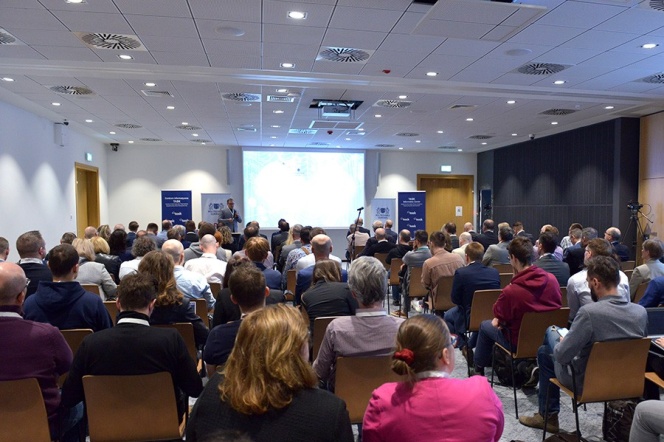Date added: 2025-04-16
CAISE – An Investment in the Technological Independence of Poland and Europe

The conference summarizing the first year of CAISE’s implementation was held on April 11 at the STOS Competence Center. It brought together representatives of local authorities, Pomeranian companies, and researchers from Gdańsk University of Technology.
It is worth recalling that the CAISE cloud platform is being developed under the European IPCEI-CIS program, financed through a competition held by the National Centre for Research and Development and funded by the National Recovery and Resilience Plan. Gdańsk University of Technology is the only academic institution in Poland to have secured financial support for this initiative, amounting to PLN 55 million.
Professor Henryk Krawczyk, the project’s originator and manager, introduced conference participants to the subject of the cloud services platform.
“Cloud Artificial Intelligence Service Engineering—CAISE for short—plays a significant role in advancing cloud-based solutions and the digitalization of the public sector. This is a formidable challenge for us as researchers and for the entrepreneurs collaborating with us, particularly because we are competing with monopolistic global giants. It is undoubtedly risky, yet deeply fascinating at the same time. Our project is therefore based on extensive collaboration, both at the local and European level, and demands innovation and the pursuit of new solutions.”
Professor Krzysztof Wilde, Rector of Gdańsk University of Technology and Chair of the CAISE Steering Committee, also addressed the attendees:
“This project represents a major distinction and a mark of trust from our European partners in our technological capabilities and research competencies. Our existing computational infrastructure enabled our entry into the project, but we are committed to its continuous enhancement. We aim for the university to acquire quantum computing capabilities by 2027—starting with 24 qubits, with a goal of reaching 105 qubits in the subsequent years. I envision a future where Pomeranian companies leverage this computational power and our innovations to create digital services that enhance their operations and efficiency. I believe Gdańsk University of Technology, along with the city of Gdańsk, the Tri-City area, and the Pomeranian region, will build their competitiveness right here.”
Piotr Orzechowski, PhD and Professor Bogdan Wiszniewski, coordinators of the service and platform development teams, presented the current state of the project’s implementation, the capabilities of the cloud platform, the services developed so far, and the challenges that await researchers and collaborating enterprises in the next phases.
The subsequent part of the conference featured representatives of partner companies involved in the project. Sebastian Szczepański, CEO of Currenda, discussed the problems and challenges faced by the judiciary, which is in pressing need of new cloud-based solutions and services to streamline court and bailiff office operations. Bogusław Tukalski, CFO of Gdańsk Educational Publishing House, outlined the company's broad educational and publishing activities and highlighted areas where the introduction of digital solutions is essential.
Kamil Sijko spoke on behalf of the medical sector, representing Transition Technologies Science—a company that develops IT solutions to support daily patient diagnostics and therapy. He emphasized the range of services that the CAISE platform can facilitate, including the rapid and effective analysis of medical records to compare therapeutic pathways, thereby optimizing treatment costs in the public healthcare system.
The final segment of the conference featured special guest Artur Kurasiński – a columnist, author of a book on Polish startups, and creator of the blog and podcast Technofobia. He emphasized that artificial intelligence is no longer a technology of the future but a critical infrastructure of the modern world.
“Decisions made today will determine whether Poland and Europe will be creators, or merely users of digital solutions developed elsewhere. That is why projects such as CAISE are of vital importance - they constitute an investment in the technological independence of our country and of the European Union,” Kurasiński concluded.

